人教版英语七年级下册第9单元课件.
- 格式:pdf
- 大小:6.64 MB
- 文档页数:43
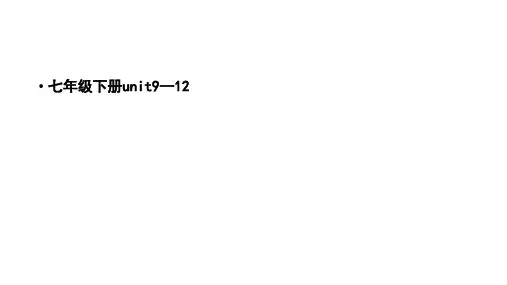
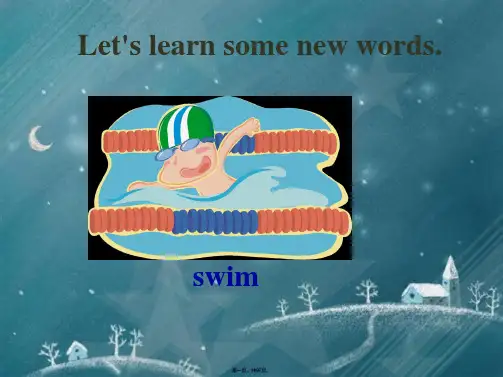
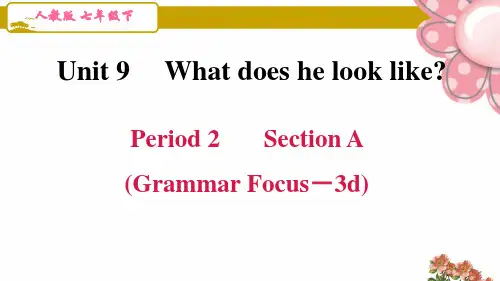
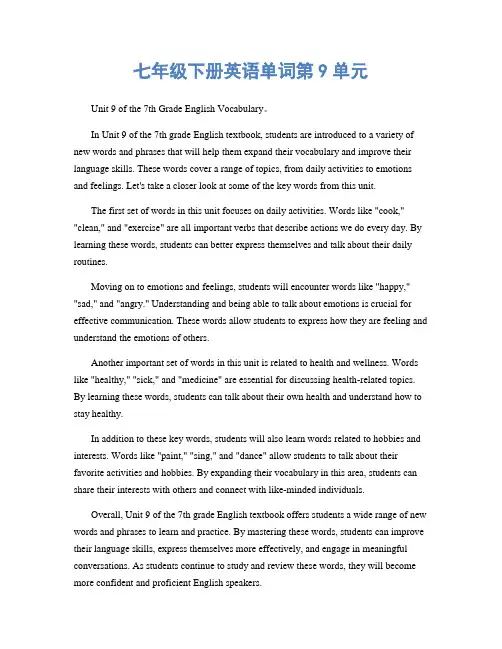
七年级下册英语单词第9单元Unit 9 of the 7th Grade English Vocabulary。
In Unit 9 of the 7th grade English textbook, students are introduced to a variety of new words and phrases that will help them expand their vocabulary and improve their language skills. These words cover a range of topics, from daily activities to emotions and feelings. Let's take a closer look at some of the key words from this unit.The first set of words in this unit focuses on daily activities. Words like "cook," "clean," and "exercise" are all important verbs that describe actions we do every day. By learning these words, students can better express themselves and talk about their daily routines.Moving on to emotions and feelings, students will encounter words like "happy," "sad," and "angry." Understanding and being able to talk about emotions is crucial for effective communication. These words allow students to express how they are feeling and understand the emotions of others.Another important set of words in this unit is related to health and wellness. Words like "healthy," "sick," and "medicine" are essential for discussing health-related topics. By learning these words, students can talk about their own health and understand how to stay healthy.In addition to these key words, students will also learn words related to hobbies and interests. Words like "paint," "sing," and "dance" allow students to talk about their favorite activities and hobbies. By expanding their vocabulary in this area, students can share their interests with others and connect with like-minded individuals.Overall, Unit 9 of the 7th grade English textbook offers students a wide range of new words and phrases to learn and practice. By mastering these words, students can improve their language skills, express themselves more effectively, and engage in meaningful conversations. As students continue to study and review these words, they will become more confident and proficient English speakers.。
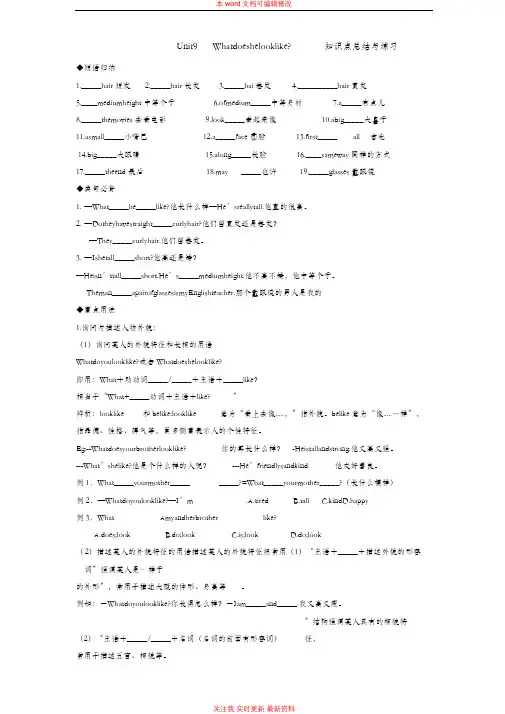
Unit9Whatdoeshelooklike?知识点总结与练习◆短语归纳1._____hair短发2._____hair长发3._____hai卷发4.__________hair直发5.____mediumheight中等个子6.ofmedium_____中等身材7.a_____有点儿8._____themovies去看电影9.look_____看起来像10.abig_____大鼻子11.asmall_____小嘴巴12.a_____face圆脸13.first_____all首先14.big_____大眼睛15.along_____长脸16.____sameway同样的方式17._____theend最后18.may_____也许19._____glasses戴眼镜◆典句必背1.—What_____he_____like?他长什么样—He’s reallytall.他真的很高。
2.—Dotheyhavestraight_____curlyhair?他们留直发还是卷发?—They_____curlyhair.他们留卷发。
3.—Ishetall_____short?他高还是矮?—Heisn’t tall_____short.He’s_____mediumheight.他不高不矮,他中等个子。
Theman_____apairofglassesismyEnglishteacher.那个戴眼镜的男人是我的◆重点用法1.询问与描述人物外貌:(1)询问某人的外貌特征和长相的用语Whatdoyoulooklike?或者Whatdoeshelooklike?即用:What+助动词_____/_____+主语+_____like?相当于“What+_____动词+主语+like? ”辨析:looklike 和belike:looklike 意为“看上去像.....,”指外貌。
belike意为“像.....一样”,指品德、性格、脾气等,更多侧重表示人的个性特征。
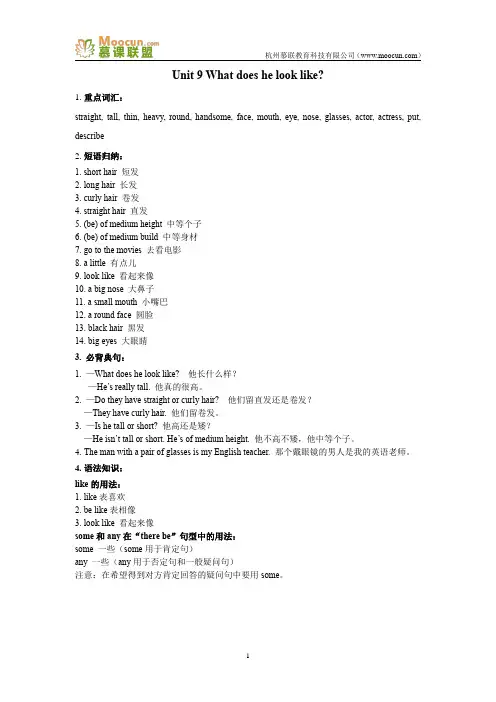
Unit 9 What does he look like?1.重点词汇:straight, tall, thin, heavy, round, handsome, face, mouth, eye, nose, glasses, actor, actress, put, describe2.短语归纳:1. short hair 短发2. long hair 长发3. curly hair 卷发4. straight hair 直发5. (be) of medium height 中等个子6. (be) of medium build 中等身材7. go to the movies 去看电影8. a little 有点儿9. look like 看起来像10. a big nose 大鼻子11. a small mouth 小嘴巴12. a round face 圆脸13. black hair 黑发14. big eyes 大眼睛3. 必背典句:1. —What does he look like? 他长什么样?—He’s really tall. 他真的很高。
2. —Do they have straight or curly hair? 他们留直发还是卷发?—They have curly hair. 他们留卷发。
3. —Is he tall or short? 他高还是矮?—He isn’t tall or short. He’s of medium height. 他不高不矮,他中等个子。
4.The man with a pair of glasses is my English teacher. 那个戴眼镜的男人是我的英语老师。
4.语法知识:like的用法:1. like表喜欢2. be like表相像3. look like 看起来像some和any在“there be”句型中的用法:some 一些(some用于肯定句)any 一些(any用于否定句和一般疑问句)注意:在希望得到对方肯定回答的疑问句中要用some。
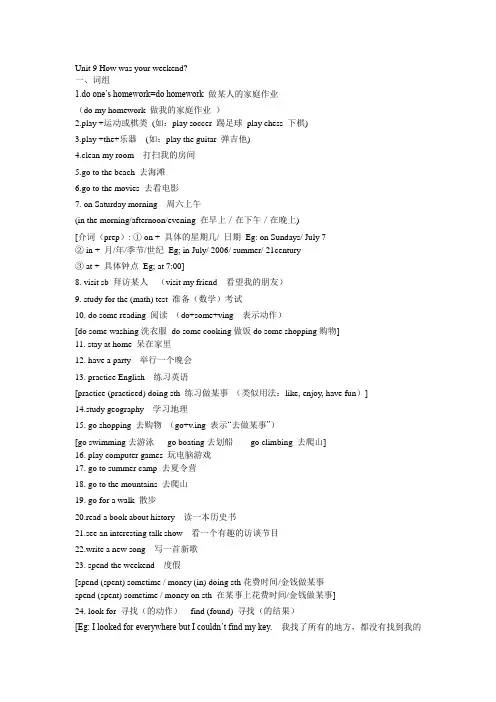
Unit 9 How was your weekend?一、词组1.do one’s homework=do homework 做某人的家庭作业(do my homework 做我的家庭作业)2.play +运动或棋类(如:play soccer 踢足球play chess 下棋)3.play +the+乐器(如:play the guitar 弹吉他)4.clean my room 打扫我的房间5.go to the beach 去海滩6.go to the movies 去看电影7. on Saturday morning周六上午(in the morning/afternoon/evening 在早上/在下午/在晚上)[介词(prep): ① on + 具体的星期几/ 日期Eg: on Sundays/ July 7② in + 月/年/季节/世纪Eg; in July/ 2006/ summer/ 21century③ at + 具体钟点Eg; at 7:00]8. visit sb 拜访某人(visit my friend 看望我的朋友)9. study for the (math) test 准备(数学)考试10. do some reading 阅读(do+some+ving表示动作)[do some washing洗衣服do some cooking做饭do some shopping购物]11. stay at home 呆在家里12. have a party 举行一个晚会13. practice English 练习英语[practice (practiced) doing sth 练习做某事(类似用法:like, enjoy, have fun)]14.study geography 学习地理15. go shopping 去购物(go+v.ing 表示“去做某事”)[go swimming去游泳go boating去划船go climbing 去爬山]16. play computer games 玩电脑游戏17. go to summer camp 去夏令营18. go to the mountains 去爬山19. go for a walk 散步20.read a book about history 读一本历史书21.see an interesting talk show 看一个有趣的访谈节目22.write a new song 写一首新歌23. spend the weekend 度假[spend (spent) sometime / money (in) doing sth花费时间/金钱做某事spend (spent) sometime / money on sth 在某事上花费时间/金钱做某事]24. look for 寻找(的动作)find (found) 寻找(的结果)[Eg: I looked for everywhere but I couldn’t find my key.我找了所有的地方,都没有找到我的钥匙。
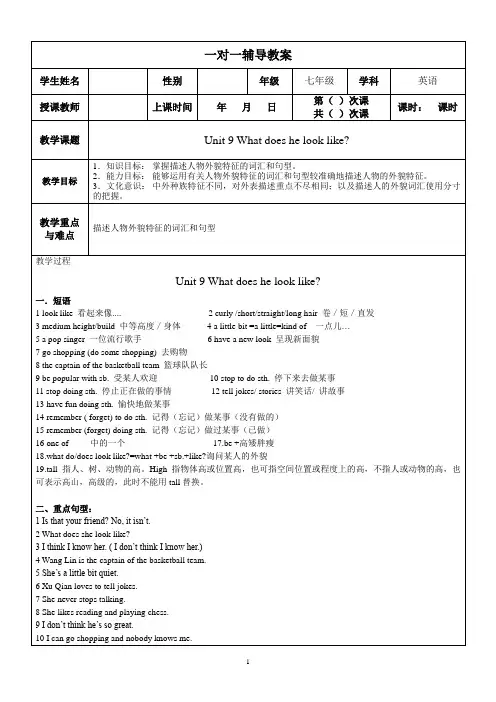
2). like喜欢like doing / like to do sth.例:我喜欢下午练习英语。
I like ___________ every afternoon.3). would like to do sth. = want to do sth练一练:1). What does your mother _____ _____? = What _____ your mother _____?(长什么模样)2). What _____ you _____ _____ have for dinner?(想要)3). _____ their teacher _____ _____ in the river? (喜欢游泳)2. a little bit = a little = a bit + 形容词;a little = a bit of + 不可数名词练一练:1). I’m ______ tired. A. a bit little B. a little bit C. bit of D. a bit of2). I have ______ homework today. A. a bit B. a lot C. a little D. a few3). I feel a little tired today. = I feel ________ _______ ________ tired today.4). There is a little bread on the plate. = The re is _____ _____ _____ bread on the plate.5). The little girl is a _____ _____ _____. 有点文静3.stop的用法:1). At the bus stop公交车站2). stop doing sth. 停止正在做的事情3). stop to do sth. 停下来去做另一件事情练一练:1). She never stops _________. A. talk B. to talk C. talking D. talks2). If you feel too tired, you can stop_____ to bed. A. go B. going C. to go D. goes3). The bus ____ at the bus ____ and the children got on the bus. 停在车站4.look的用法:1). have a new look面貌焕然一新2). look at = have a look at看一看3). look + 形容词, 看起来…4). look like + 名词,看起来像…5). look for 寻找5.remember / forget to do sth. 记住/ 忘记去做某事.如:_____ _____ _____ close the door before you leave. = _____ _____ close the door before you leave. 离开前别忘关门。
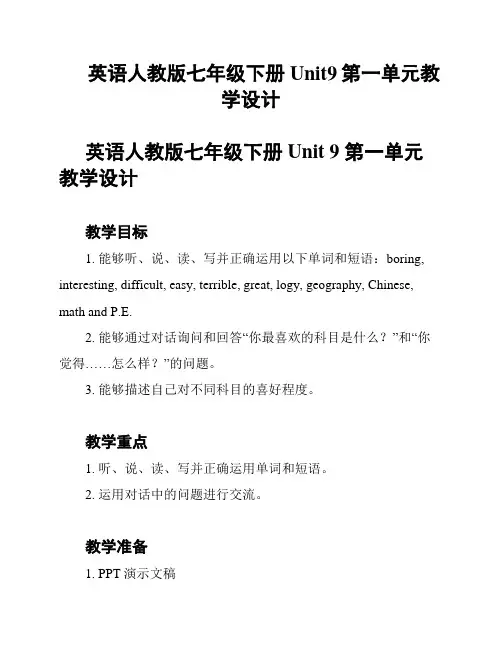
英语人教版七年级下册Unit9第一单元教学设计英语人教版七年级下册 Unit 9 第一单元教学设计教学目标1. 能够听、说、读、写并正确运用以下单词和短语:boring, interesting, difficult, easy, terrible, great, logy, geography, Chinese, math and P.E.2. 能够通过对话询问和回答“你最喜欢的科目是什么?”和“你觉得……怎么样?”的问题。
3. 能够描述自己对不同科目的喜好程度。
教学重点1. 听、说、读、写并正确运用单词和短语。
2. 运用对话中的问题进行交流。
教学准备1. PPT演示文稿2. 学生练册和教科书3. 录音设备教学过程步骤1:导入新词汇(15分钟)1. 引导学生一起回顾上一单元学到的词汇,并通过图片和动作示范帮助学生理解新单词的意义。
2. 分组让学生用英语根据图片进行词汇对话练。
步骤2:新课呈现(15分钟)1. 利用PPT呈现新课,同时向学生展示有关各科目的图片和标签。
2. 让学生观察图片并讨论相关科目的难易程度、有趣程度和喜好程度。
步骤3:听力训练(15分钟)1. 播放录音,让学生听音选择正确答案。
2. 听完录音后,老师和学生一起核对答案,并进行必要的解释和补充说明。
步骤4:口语训练(20分钟)1. 分组进行对话练,学生互相询问对各科目的喜好程度,并给予回答。
2. 鼓励学生用学过的单词和短语回答问题,例如:“I like ___.” 或者“Chinese is difficult for me, but math is easy.”步骤5:听力训练(15分钟)1. 播放录音,让学生听音并判断句子是否正确。
2. 听完录音后,老师和学生一起核对答案,并进行必要的解释和补充说明。
步骤6:巩固练(20分钟)1. 学生们在练册上完成相关练,巩固对本单元知识的掌握。
2. 老师巡视、指导和纠正学生的练,解答学生的问题。

Unit 9 What does he look like?1.重点词汇:straight, tall, thin, heavy, round, handsome, face, mouth, eye, nose, glasses, actor, actress, put, describe2.短语归纳:1. short hair 短发2. long hair 长发3. curly hair 卷发4. straight hair 直发5. (be) of medium height 中等个子6. (be) of medium build 中等身材7. go to the movies 去看电影8. a little 有点儿9. look like 看起来像10. a big nose 大鼻子11. a small mouth 小嘴巴12. a round face 圆脸13. black hair 黑发14. big eyes 大眼睛3. 必背典句:1. —What does he look like? 他长什么样?—He’s really tall. 他真的很高。
2. —Do they have straight or curly hair? 他们留直发还是卷发?—They have curly hair. 他们留卷发。
3. —Is he tall or short? 他高还是矮?—He isn’t tall or short. He’s of medium height. 他不高不矮,他中等个子。
4.The man with a pair of glasses is my English teacher. 那个戴眼镜的男人是我的英语老师。
4.语法知识:like的用法:1. like表喜欢2. be like表相像3. look like 看起来像some和any在“there be”句型中的用法:some 一些(some用于肯定句)any 一些(any用于否定句和一般疑问句)注意:在希望得到对方肯定回答的疑问句中要用some。
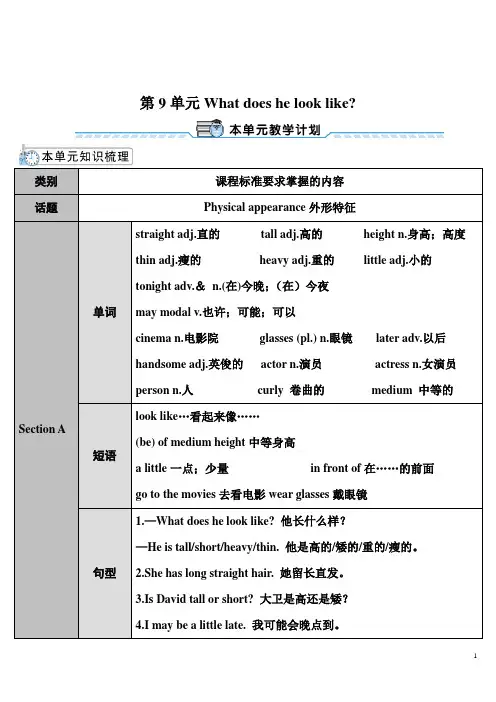
第9单元What does he look like?类别课程标准要求掌握的内容话题Physical appearance外形特征Section A 单词straight adj.直的tall adj.高的height n.身高;高度thin adj.瘦的heavy adj.重的little adj.小的tonight adv.&n.(在)今晚;(在)今夜may modal v.也许;可能;可以cinema n.电影院glasses (pl.) n.眼镜later adv.以后handsome adj.英俊的actor n.演员actress n.女演员person n.人curly 卷曲的medium 中等的短语look like…看起来像……(be) of medium height中等身高a little一点;少量in front of在……的前面go to the movies去看电影wear glasses戴眼镜句型1.—What does he look like? 他长什么样?—He is tall/short/heavy/thin. 他是高的/矮的/重的/瘦的。
2.She has long straight hair. 她留长直发。
3.Is David tall or short? 大卫是高还是矮?4.I may be a little late. 我可能会晚点到。
newspapers and on television to find him.然后,乔画出罪犯的肖像,警察把它放在报纸上和电视上来寻找此人。
4.In the end, the real criminal is a short and heavy old man, and hehas short black hair!最后,真正的罪犯是一位又矮又胖的老年人,他留着黑色的短发!语法 1.询问及描述外貌 2.多个形容词的排列顺序写作描述人物外貌知识目标询问及描述长相;学习描述性形容词。
人教版七年级下册英语第九单元基础知识点Unit9 What does he look like?【重点单词】curly adj.卷曲的straight adj.直的tall adj.高的medium adj. 中等的height n.身高;高度of medium height 中等身高thin adj.瘦的heavy adj.重的build n.身材of medium build 中等身材tonight adv.&n.今夜little adj.小的a little 一点,少量cinema n.电影院glasses n.眼镜later adj.以后handsome adj.英俊的actor n.演员actress n.女演员person n.人nose n.鼻子blonde adj.金黄色的mouth n.嘴round adj.圆形的face n.脸eye n.眼睛singer n.歌手artist n.艺术家crime n.犯罪活动criminal n.罪犯put v.放each adj.&pron.每个,各自way n.方式,路线describe v.描述differently adv.不同地another adj.&pron另一,又一end n.结尾,尽头in the end 最后real adj.真正的;真实的jeans n.牛仔裤【重点短语】1.short hair短发2.long hair长发3.curly hair卷发4.straight hair直发5.(be)of medium height中等个子6.(be)of medium build中等身材7.go to the movies去看电影8.a little有点儿9.look like看起来像10.a big nose大鼻子11.a small mouth小嘴巴12.a round face圆脸13.black hair黑发14.big eyes大眼睛15.a long face长脸16.the same way同样的方式17.in the end最后18.blonde hair金黄色的头发【重点句型】1.I may be a little late.我或许要晚一会儿。
2021Unit 9 What does he look like?Section A (1a-2d)一、教学目标:1. 语言知识目标:1) 能掌握以下单词: curly, straight, tall, medium, thin, heavy, build, tonight, little, cinema, glasses, later能掌握以下句型:—What does he look like?—He’s of medium build.—What does he look like?—She has long straight hair.—Is he tall or short?2. 情感态度价值观目标:让学生学会友好、客观地描述人的形象。
二、教学重难点1. 教学重点:掌握单词,熟练掌握描述人的形象的句型。
2. 教学难点:掌握描述人的形象的句型。
三、教学过程Ⅰ. Warming-up and revision2021找出三名外貌差异较大的学生来做比较,一个胖而高大的男生(a fat and tall boy),一个瘦而较矮的男生(a thin and short boy),一个中等身材(of medium height)。
目的:引起学生的学习兴趣,了解人物的外貌特征,(即不管外貌如何在不同的游戏中都能获胜)的对比培养学生的情感和态度:不要以貌取人(Don’t judge by appearance)。
然后用这两名学生为例教heavy, tall, thin, short引出句型:1. What do you look like? He’s really tall. He has long straight hair.2. What does she look like? She’s of medium build.…Ⅱ. Presentation (Section A 1a)1. Match the words with the people in the picture. (1a)学习课本的第一部分P49,1a先看图片,然后搭配图片和相关的外貌特征的词。